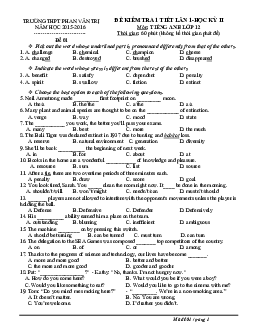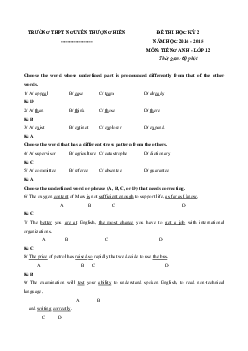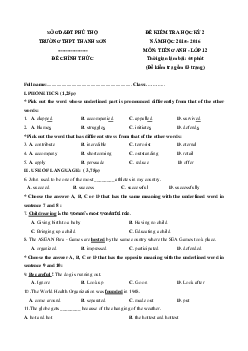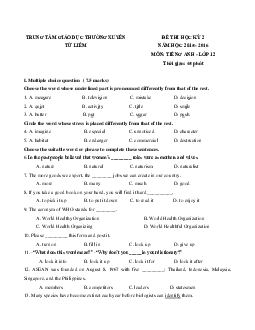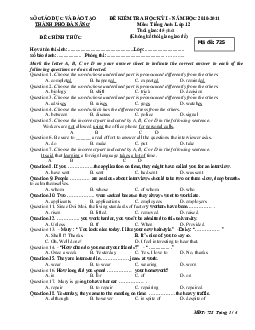










Preview text:
ĐỀ LUYỆN THI THPT QUỐC GIA MÔN TIẾNG ANH
NĂM 2019 CÓ ĐÁP ÁN
Mark the letter A, B, C, or D on your answer sheet to indicate the word whose
underlined part differs from the other three in pronunciation in each of the following questions.
Question 1: A. helps B. laughs C. cooks D. finds
Question 2: A. humour B. honest C. honour D. hour
Mark the letter A, B, C, or D on your answer sheet to indicate the word that differs
from the other three in the position of primary stress in each of the following questions.
Question 3: A. nature B. marriage C. value D. belief
Question 4: A. official B. disturbance C. informal D. recommend
Mark the letter A, B, C, or D on your answer sheet to indicate the correct answer to
each of the following questions.
Question 5: She works seven days ______week. A. a B. the C. an D. x
Question 6: John would be taking a great risk if he ______his money in that business.
A. would invest B. invested C. had invested D. invests
Question 7: He ______football since he was a boy. A. plays B. is playing C. has played D. played
Question 8: ______it was so cold, he went out without an overcoat. A. If B. Since C. Although D. Because
Question 9: We are sure to pass the exam. We feel sure ______it. A. to B. for C. in D. of
Question 10: ______the top of the hill, we suddenly caught sight of the sea. A. On reaching B. Reach C. Reached D. To reach
Question 11: ______, the students did their homework. A. Asked B. Having asked C. Asking D. Having been asked
Question 12: The police accused him of______fire to the building but he denied______in
the area on the night of the fire.
A. setting/ being B. setting/ having been
C. set/ be D. having set/ having been
Question 13: Burning coal is an______way of heating a house. Gas is much cheaper.
A. uneconomical B. economic C. uneconomic D. economical
Question 14: The boy’s strange behavior aroused the ______of the shop assistant. A. thought B. consideration
C. expectations D. suspicions
Question 15: If you practice regularly, you can learn this language skill in short ______of a time. A. period B. aspect C. arrangement D. activity
Question 16: I gave the waiter a $50 notes and waited for my ____________ A. change B. supply C. cash D. cost
Question 17: Sarah and I ______reserved the rooms in the same hotel. She was really surprised to see me there. A. intentionally B. practically C. coincidentally D. deliberately
Question 18: My sister ______the responsibility for doing the housework. A. bears B. runs C. holds D. takes
Mark the letter A, B, C, or D on your answer sheet to indicate the word(s) CLOSEST
in meaning to the underlined word(s) in each of the following questions.
Question 19: In 1985, the Coca-Cola Company altered the secret formula of the drink’s ingredients. A. modified B. proposed C. enriched D. restored
Question 20: Every time he opens his mouth, he immediately regrets what he said. He’s
always putting his foot in his mouth.
A. saying embarrassing things B. making a mistake
C. doing things in the wrong order D. speaking indirectly
Mark the letter A, B, C, or D on your answer sheet to indicate the word(s) OPPOSITE
in meaning to the underlined word(s) in each of the following questions.
Question 21: Some vegetables are grown without soil and artificial light. A. real B. natural C. genuine D. true
Question 22: We were all in a good mood because the weather was good and we were
going on holiday the next day.
A. relaxed and comfortable
B. at ease and refreshed
C. happy and disappointed D. sad and impatient
Mark the letter A, B, C, or D on your answer sheet to indicate the option that best
completes each of the following exchanges.
Question 23: Phil invites Mark to his house.
- Mark: “What a lovely house you have!” - Phil: “______” A. No problem.
B. Thank you. Hope you will drop in. C. I think so.
D. Of course not, it’s not costly.
Question 24: Mike talks about the test result to Thomas.
- Mike: “My first English test was not as good as I expected.” - Thomas: “______” A. Good Heavens !
B. That’s brilliant enough !
C. It’s okay, don’t worry. D. Never mind, better job next time !
Read the following passage and mark the letter A, B, C, or D on your answer sheet to
indicate the correct word or phrase that best fits each of the numbered blanks from 25 to 29.
No one can say when sports began. Since it is impossible to (25) _____ a time when
children did not spontaneously run races or wrestle, it is clear that children have always
included sports in their play, but one can only speculate about the (26) _____ of sports as
autotelic physical contests for adults. Hunters are depicted in prehistoric art, but it cannot be
known (27) _____ the hunters pursued their prey in a mood of grim necessity or with the
joyful abandon of sportsmen. It is certain, (28) ______, from the rich literary and
iconographic evidence of all ancient civilizations that hunting soon became an end in itself at
least for royalty and nobility. Archaeological evidence also indicates that ball games were
common among ancient peoples as (29) _____as the Chinese and the Aztecs.
(https://www.britannica.com/topic/sports)
Question 25: A. think B. see C. have D. imagine
Question 26: A. emergence B. emerge C. emergency D. immersion Question 27: A. when B. whether C. how D. why
Question 28: A. therefore B. so C. consequently D. however
Question 29: A. different B. far C. similar D. old
Read the following passage and mark the letter A, B, C, or D on your answer sheet to
indicate the correct answer to each of the questions from 30 to 34.
Over the past 600 years, English has grown from a language of few speakers to become the
dominant language of international communication. English as we know it today emerged
around 1350, after having incorporated many elements of French that were introduced
following the Norman invasion of 1066. Until the 1600s, English was, for the most part,
spoken only in England and had not extended even as far as two centuries, English began to
spread around the globe as a result of exploration, trade (including slave trade), colonization,
and missionary work. Thus, small enclaves of English speakers became established and
grew in various parts of the world. As these communities proliferated, English gradually
became the primary language of international business, banking and diplomacy.
Currently, about 80 percent of the information stored on computer systems worldwide is
English. Two - thirds of the world’s science writing is in English, and English is the main
language of technology, advertising, media, international airports, and air traffic controllers -
Today there are more than 700 million English users in the world, and over half of these are
nonnative speakers, constituting the largest number of nonnative users than any other language in the world.
Question 30. What is the main topic of this passage?
A. The French influence on the English Language.
B. The English history.
C. The expansion of English as an international language.
D. The use of English for science and Technology.
Question 31. Approximately when did English begin to be used beyond England?
A. in 1066 B. around 1350 C. before 1600 D. after 1600
Question 32. According to the passage, all of the following contributed to the spread of
English around the world except.
A. the slave trade B. the Norman invasion C. missionaries D. colonization
Question 33. The word “enclaves” in line 6 could be best replaced by which of the following.
A. communities B. organizations C. regions D. countries
Question 34. The word "these" in paragraph 2 refers to______
A. users B. airports C. controllers D. speakers
Read the following passage and mark the letter A, B, C, or D on your answer sheet to
indicate the correct answer to each of the questions from 35 to 42.
It takes a long time to raise a family of owlets, so the great horned owl begins early in
the year. In January and February, or as late as March in the North, the male calls to the
female with a resonant hoot. The female is larger than the male. She sometimes reaches a
body length of twenty-two to twenty-four inches, with a wingspread up to fifty inches. To
impress her, the male does a strange courtship dance. He bobs. He bows. He ruffles his
feathers and hops around with an important air. He flutters from limb to limb and makes
flying sorties into the air. Sometimes he returns with an offering of food. They share the
repast, after which she joins the dance, hopping and bobbing about as though keeping time
to the beat of an inner drum. Owls are poor home builders. They prefer to nest in a large
hollow in a tree or even to occupy the deserted nest of a hawk or crow. These structures are
large and rough, built of sticks and bark and lined with leaves and feathers. Sometimes owls
nest on a rocky ledge, or even on the bare ground, even to occupy the deserted nest of a
hawk or crow. The mother lays two or three round, dull white eggs. Then she stoically setdes
herself on the nest and spreads her feather skirts about her to protect her precious
charges from snow and cold. It is five weeks before the first downy white owlet pecks its
way out of the shell. As the young birds feather out, they look like wise old men with their
wide eyes and quizzical expressions. clamor for food and keep the parents busy supplying
mice, squirrels, rabbits, crayfish, and beetles. Later in the season baby crows are taken.
Migrating songsters, waterfowl, and game bird? all fall prey to the hungry family. It is
nearly ten weeks before fledgings leave the nest to search for their own food. The parent
birds weary of family life by November and drive the young owls away to establish hunting ranges of their own
Question 35: What is the topic of this passage?
A. Mating rituals of great horned owls
B. Raising a family of great horned owls
C. Habits of young great horned owls
D. Nest building of great horned owls
Question 36: The phrase “a resonant hoot” is closest in meaning to A. a sound B. an offering of food C. an instrument D. a movement
Question 37: It can be inferred from the passage that the courtship of great horned owls ______. A. happens in the fall
B. takes place on the ground
C. involves the male alone
D. in an active process
Question 38: According to the passage, great horned owls ______.
A. may inhabit a previously used nest
B. are discriminate nest builders
C. need big nests for their numerous eggs
D. build nests on tree limbs
Question 39: According to the passage, which of the following is the mother owl’s job? A. To build the nest
B. To initiate the courtship ritual C. To sit on the nest D. To feed the young
Question 40: The phrase “precious charges” refers to ______. A. the hawks and crows B. other nesting owls C. the nest D. the eggs
Question 41: According to the passage, young owlets eat everything EXCEPT ______. A. insects B. other small birds
C. small mammals D. nuts and seeds
Question 42: The word “they” refers to______.
A. the adult birds B. the wise old men C. the prey D. the young birds
Mark the letter A, B, C, or D on your answer sheet to indicate the underlined part that
needs correction in each of the following questions.
Question 43: Scientists do not yet thoroughly understand how just the body of an individual A B C
becomes sensitive to a harmless substance such as milk, wheat, and egg. D
Question 44: Because the highway system was built 40 years ago, most of the roads now need A B C to repair. D
Question 45: Slightly nodding to someone is usually considered impolite but it is acceptable A B
when a teacher wants to get someone’s attention in class. C D
Mark the letter A, B, C, or D on your answer sheet to indicate the sentence that is
closest in meaning to each of the following questions.
Question 46: He makes a better husband than father.
A. He tries to be a good husband than father.
B. His father is better than her husband.
C. He is more successful as a husband than as a father.
D. Fathers are usually good husbands.
Question 47: “Don’t forget to hand in the report, Peter !” said Kate
A. Kate reminded Peter of handing in the report.
B. Kate said that Peter had forgotten to hand in the report.
C. Kate forgot to hand in the report to Peter.
D. Kate reminded Peter to hand in the report.
Question 48: It is possible that one of the men died on the mountain.
A. One of the men must have died on the mountain.
B. One of the men may have died on the mountain.
C. One of the men need have died on the mountain.
D. One of the men should have died on the mountain.
Mark the letter A, B, C, or D on your answer sheet to indicate the sentence that best
combines each pair of sentences in the following questions.
Question 49: Susan didn’t buy that villa. She regrets this.
A. Susan wished she had bought that villa.
B. Susan wished she bought that villa.
C. Susan regrets buying that villa.
D. If only Susan hadn’t bought that villa.
Question 50: The student was very bright. He could solve all the math problems.
A. He was such bright student that he could solve all the math problem.
B. The student was very bright that he could solve all the math problem.
C. He was such bright a student that he could solve all the math problem.
D. So bright was the student that he could solve all the math problem.
